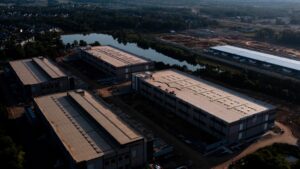AI Drives Rapid Growth of Y Combinator Startups, Setting Fund History Records

The Impact of Artificial Intelligence on Silicon Valley Startups
The Surge of AI in Startup Accelerators
Silicon Valley’s startup landscape is transforming, largely fueled by advancements in artificial intelligence (AI). One of the leaders in this shift is Y Combinator, a prominent startup accelerator that has supported some of the most successful tech companies, including Airbnb, Dropbox, and Stripe. Recently, Y Combinator held its annual demo day in San Francisco. During this event, startup founders had the opportunity to showcase their businesses to a room full of potential investors.
According to Garry Tan, the CEO of Y Combinator, the current cohort of startups is experiencing unprecedented growth rates compared to previous years. Over the past nine months, participating companies have seen an impressive average growth rate of 10% per week. Tan emphasized that this growth is not confined to just one or two standout companies, but rather reflects the success of the entire group.
AI-Driven Efficiency in Startups
The resurgence of AI has significantly contributed to this robust growth. Developers have begun to automate repetitive tasks and leverage large language models to generate code more efficiently. This trend is referred to by Tan as "vibe coding," where AI takes the lead in software creation. In many cases, AI can write entire applications, drastically reducing the workload for human developers.
This capability enables startups to operate with smaller teams. Tan noted that around 25% of the current Y Combinator startups are able to complete 95% of their coding through AI. This shift allows companies to achieve substantial revenue—sometimes reaching as high as $10 million—with teams comprised of fewer than ten individuals. Consequently, the financial burden on these startups is lightened, making it easier for them to secure funding and extend their operational capital.
A New Focus on Profitability
The startup environment is experiencing a significant shift from a previous focus on rapid growth to one centered around profitability. Tan highlighted the changing attitudes in Silicon Valley, pointing out that the era of seeking growth at all costs has come to an end. Even large tech corporations such as Google, Meta, and Amazon are adjusting their strategies, resulting in layoffs and a decrease in hiring.
While these changes have created anxiety among some engineers, Tan views it as an opportunity for talented individuals to venture into startup territory. Many skilled professionals previously aimed for jobs at large tech firms now have the chance to build businesses that can generate substantial revenue with small teams. The startup landscape is ripe for innovation and growth, particularly for engineers ready to take the leap.
The Dominance of AI-Focused Startups
During the demo day, about 80% of the pitching companies were centered on AI, with a few focusing on robotics and semiconductors. These AI-centric startups have demonstrated the ability to achieve commercial validation quicker than prior generations. Investors attending the event were able to hear directly from real customers, underscoring the practical application and demand for their products.
Y Combinator, founded in 2005, has established itself as a vital resource for budding entrepreneurs, investing $500,000 in exchange for equity in startups. Over the years, Y Combinator has nurtured over 5,300 companies valued collectively at more than $800 billion. With a highly selective acceptance process, only around 1% of applicants gain entry to the program.
Y Combinator’s Competitive Edge
While numerous venture capital incubators have emerged in recent years, Y Combinator remains a revered institution due to its extensive network and resources. Tan argues that the benefits of joining Y Combinator continue to grow stronger, enabling flexibility for startups to pivot or redefine their ideas. About 20% to 30% of companies within Y Combinator change their focus or even their industry entirely. Specialized incubators may restrict this adaptability, which is vital in the ever-evolving tech landscape.
In this dynamic environment, Y Combinator is playing a pivotal role in harnessing the power of AI and fostering the next generation of innovative startups. By emphasizing both technological advancement and practical application, these startups are well-positioned for success in the competitive world of tech.




